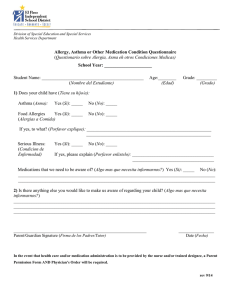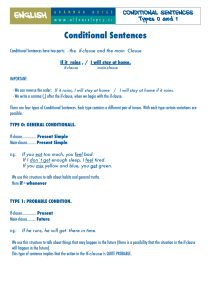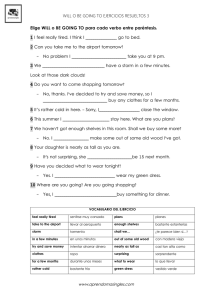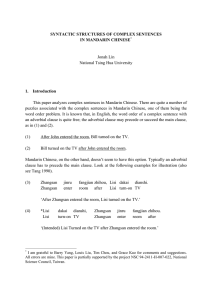conditional sentences - El Picacho
Anuncio
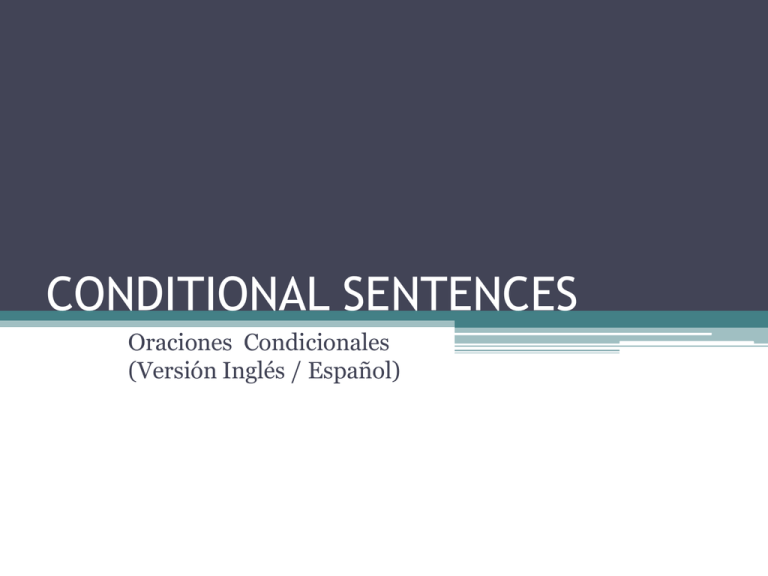
CONDITIONAL SENTENCES Oraciones Condicionales (Versión Inglés / Español) CONDITIONAL SENTENCES I will go to the park if Sarah comes with us I will go to the park if Sarah comes with us Conditional Sentences are divided into two different parts: (Dos partes principales) Main clause: I will go to the park… (Frase principal) If-clause: …if Sarah comes with us (Condición) Four types of Conditional Sentences: Type O or Zero Conditional: General truths, scientific facts (Verdades generales o hechos científicos) “If you heat ice, it melts” “Ice melts if you heat it” (The order can be changed) (Se puede cambiar el orden de las dos frases) Main clause: Ice melts… If-clause: …if you heat it Verbal Tenses: Main clause: Present Simple If-clause: Present Simple Type I or Possible Condition: It is possible and also very likely that the condition will be fulfilled. (Es muy posible que la condición llegue a realizarse) If I find her phone number, I will send it to you If-clause: If I find her phone number… Main clause: …I will send it to you Verbal Tenses: Main clause: Future Simple If-clause: Present Simple Esta fórmula no es fija, puede variar como podemos ver en la siguiente diapositiva Variations to type I (advanced) a.- variations of the main clause: b.- variations of the if-clause: 1. MAY / MIGHT (possibility). 1. PRESENT CONTINUOUS: to indicate a present action or a future arrangement. If the fog gets thicker the plane may/might be diverted 2. MAY (permission) or CAN (permission or ability) If your documents are in order you may/can leave at once 3. MUST / SHOULD or any expression of command, request or advice. If you want to lose weight you must / should eat less bread. If you want to lose your weight you had better eat less bread If you want to lose weight eat less bread. If you see Tom tomorrow, could you ask him to ring me? If you are waiting for the bus you'd better join the queue If you are looking for Peter you'll find him upstairs. If you are staying for another night I'll ask the manager to give you a better room. 2. PRESENT PERFECT If you have finished dinner I'll ask the waiter for the bill. CONDITIONAL SENTENCES : TYPE 1 ACTIVITIES 1. I'll look for your notebook and if I (find) it I (give) you a ring. 2. If you (smoke) in a non-smoking compartment the other passengers (object). 3. I'll wash the glasses in this nice hot water. No, don't. If you (put) them into very hot water they (crack). 4. If you (see) Tom, Tell him I have a message for him. 5. If he (win) he (get) $1,000; If he (come) in second he (get) $500. 6. If you (feel) too hot during the night turn down the central heating. 7. If he (want) more money he (have) to do more work. 8. If you (finish) with your dictionary I'd like to borrow it. 9. If he (stand) up in the canoe it (capsize). 10. The lift wasn't working when I was here last. If it still (not work) we have to use the stairs. Type II or Unlikely Condition: It is possible but very unlikely, that the condition will be fulfilled. (Es improbable que la condición llegue a realizarse) If I saw her, I would tell her the truth If-clause: If I saw her… Main clause: …I would tell her the truth We usually use WERE for all the persons of verb TO BE If I were a rich man, I’d help people in Africa Verbal Tenses: Main clause: Conditional Simple If-clause: Past Simple Esta fórmula no es fija, puede variar como podemos ver en la siguiente diapositiva Variations to type II (advanced) a.- variations of the main clause: b.- variations of the if-clause: 1. - MIGHT / COULD If you tried again you might / could succeed. 1. PAST CONTINUOUS: 2. CONTINUOUS CONDITIONAL FORM I hate flying. If we were going by boat I'd feel much happier. Peter is on holiday ; he is touring Italy. If I were on holiday I would / might be touring Italy too. 3. SIMPLE PAST : to express automatic or habitual reactions in the past If anyone interrupted him he got angry. 2. PAST PERFECT: If he had taken my advice he would be a rich man now. CONDITIONAL SENTENCES: TYPE 2 ACTIVITIES 1. If I (give) her a diamond ring she (sell) it. 2. If you (go) on a diet you (lose) weight. 3. If we (work) all night we (finish) in time; but we have no intention of working all the night. 4 You must never blow out a gas light. Do you know what (happen) if you (blow )out a gas light? 5. If I (see) a tiger walking along the street I (climb) a tree. 6. If it (be) summer the people (not sit) round that big fire. 7. If you (type) your notes they (be) a lot of easier to read. Type III or Impossible Condition: It is impossible that the condition will be fulfilled because it refers to the past. (Es imposible que la condición llegue a realizarse pues se refiere al pasado) If I had found her phone number, I would have sent her a message for the party If-clause: If I had found her phone number… Main clause: …I would have sent her a message for the party Verbal Tenses: Main clause: Conditional Perfect (would+have+P.P.) If-clause: Past Perfect (had+P.P.) Esta fórmula no es fija, puede variar como podemos ver en la siguiente diapositiva Variations to type III (advanced) a. Variations of the main clause 1. COULD OR MIGHT may be used instead of WOULD If we had found him earlier we could have saved his life. 2. The continuous form of the perfect conditional may be used. At the time of the accident I was sitting in the back of the car, because Tom's little boy was sitting beside him in front. If Tom's boy had not been there I would have been sitting in front. b. Variations of the if- clause 1. We can use the past perfect continuous in the If- clause. Luckily I was wearing a seat belt. If I hadn't been wearing one I would have been seriously injured. Other possible changes 1. A combination of types 2 and 3 is possible: The plane I intended to catch crashed and everyone was killed: If I had caught that plane I would be dead now or I would have been killed. 2. In type 3 “had” can be placed first and the “if” omitted: If you had obeyed orders this disaster would not have happened Had you obeyed orders this disaster would not have happened CONDITINAL SENTENCES: Type 3 ACTIVITIES 1. If she ........ (not make) these calls, the bill........ (be) smaller. 2. What........... (you / do) if I ..........( not work)? 3. If he ........... ( be born ) in Italy, he .......... (be called ) Arturo. 4. educated university / got better job 5. not worked at library / not met Mary. 6. not won TV quiz contest / spent honeymoon in England 7. married Sheila / lived in Middleford. 8. If the man ..........( be looking ) the wrong way, he ......... (see ) the car. WRITE A SENTENCE BEGINNING WITH IF FOR THESE SITUATIONS. Example A doctor recommended his patient to have an operation. The patient refused and died. The doctor says: " If he ...." If he had had the operation, he wouldn't have died. a. Joe told Fred to bet five pounds on a horse called Greased Lightning. Fred refused. Later Joe tells Fred that he bet five pounds a won a hundred pounds and adds: "If you ..." b. Arthur says he can't pay his bills because he didn't make a budget and adds: "If I ...“ c. Sheila tells Harry she saw him in the street yesterday and tells him off because he didn't speak to her. Harry protests that he didn't see her and adds: "If I ..." d.The teacher is disappointed that Stephen didn't pass his examination. He knows that Stephen didn't do any work. He tells him: "If you ..." e.Keith had arranged to fly to America on flight BA 329 last weekend. He couldn't go because he had 'flu. Unfortunately the plane crashed and there were no survivors. Keith says : "If I..." f. Mary missed the last bus home because she stayed talking to hi s girl-friend Liz. When she came home by taxi, Arthur says: "If you ..." g. Dr Newton forgot to lock the back door and a burglar came and stole his First Aids kit and he says : "If I ..." If can be replaced by: UNLESS a menos que … • Unless + affirmative verb = if + negative I won’t phone you if you don’t want me to I won’t phone you unless you want me to UNLESS Activities Write a new sentence with the same meaning. Use unless in your sentences Example: You must study more or you won’t pass the examination You won’t pass the examination unless you study more 1. 2. 3. 4. 5. 6. 7. 8. 9. You must listen carefully or you won’t know what to do We must hurry or we’ll miss the train You must speak very slowly or he won’t be able to understand you My salary must be increased or I’ll look for another job She must apologise to me or I won’t forgive her I’m going to the party only if you go too You are allowed into the club only if you are a memeber The dog will attack you only if you move He’ll speak to you only if you ask him a question IN CASE: por si… (different from in case (en caso de..) : e.g. In case of fire, please leave the building as quickly as possible) We use in case to talk about doing something now to avoid a future problem. It gives a reason. I’ll phone my parents in case they’re worried about me We use if to talk about a reaction to, or the result of, a future action My parents will be angry if I get home late tonight I’ll be in trouble if I get home late tonight IN CASE Activities Write sentences with in case Example: It was possible that John would phone. So I didn’t go out I didn’t go out in case John phoned 1. It was possible that he would come to London one day. So I gave him my address 2. It was possible that I wouldn’t see her again. So I said goodbye 3. It was possible that her parents were worried about her. So she phoned them 4. It was possible that I would forget the name of the street. So I wrote it down 5. It was possible that the hadn’t received my first letter. So I wrote them a second letter PROVIDED (THAT) / PROVIDING (THAT): siempre que…; a condición de que… (but only if…) Provided (that) can replace if when there is a strong idea of limitation or restriction. It is chiefly used with permission You can camp here provided that you leave no mess Providing ( that) she studies hard, she might pass the examination IF ONLY: si…! If only + present / will = hope ; e.g. If only he comes in time! If only + past / past perfect = regret ; e.g. If only he didn’t drive so fast! If only + would… (regret) = I wish + would ; e.g. If only he would drive more slowly AS LONG AS: con tal de que… As long as you listen to my problems I won’t feel so depressed Unless, as long as, providing, provided? Circle the correct word or expression for each sentence Example: You can use my car unless/ as long as you drive carefully 1. I’m playing tennis tomorrow unless/ providing it’s raining 2. We’re going to start painting the house tomorrow unless/provided it’s not raining 3. You can smoke in here unless/as long as you leave a window open to let the smoke out 4. George doesn’t trust anyone. He won’t lend you any money unless/as long as you promise in writing to pay him back 5. The children can stay here unless/providing they don’t make too much noise 6. I’m going now unless/provided you want me to stay 7. I can’t understand why he is late unless/as long as he didn’t get our message BUT FOR: si no fuera por… / si no hubiese sido por… My father sends me an allowance. But for that I wouldn’t be here The storm delayed us. But for the storm we would have been in time SUPPOSE /SUPPOSING = What if…? Suppose the plane is late? = What if / What will happen if the plane is late? I WISH: ojalá…! We use the past for a present situation after wish. We use wish to say that we regret something, that something is not as we would like it to be: (lamentamos algo que que no es como nos gustaría que fuese) e.g. “ I wish I knew Sue’s telephone number.” (¡Ojalá supiera el teléfono de Sue!) (As in if – clauses, we can use were instead of was after wish e.g. I wish I were taller (¡Ojalá fuese más alto!) We use past perfect after wish when you say that you regret something that happened or didn’t happen in the past (Lamentamos algo que pasó o no pasó en el pasado) e.g. I wish I had known that Ann was ill. I would have gone to see her. (¡Ojala hubiese sabido que Ann estaba enferma. Habría ido a verla!) I wish Activities (Past) You have to imagine that you are in a situation. For each situation, make a sentence with I wish… Example: You’ve eaten too much and now you feel sick You say: I wish I hadn’t eaten so much 1. You’ve just painted the door red. Now you decide that it doesn’t look very nice You say: 2. You are walking in the country. You would like to take some photographs but you didn’t bring your camera. You say: 3. A good friend of yours visited your town but unfortunately you were away when he came. So you didn’t see him. You say: 4. You’ve just come back from your holiday. Everything was fine except for the hotel, which wasn’t very good. You say: I wish Continues We sometimes use would after I wish… Study this example: It is raining. Tom wants to go out, but not in the rain. He says: “ I wish it would stop raining” (¡Ojalá dejara de llover!) This means that Tom is complaining about the rain and wants it to stop. We use I wish… would … when we want something to happen or somebody to do something. The speaker is complaining about the present situation. (queremos que algo ocurra o que alguien haga algo) •I wish someone would answer that telephone. It’s been ringing for about five minutes •The music next door is very loud. I wish they would turn it down. •I wish you wouldn’t drive so fast. It makes me nervous. We use I wish… would when we want something to change or somebody else to do something. So you cannot say “ I wish I would…” Se usa sólo cuando queremos que algo cambie o que alguien haga algo, nunca para nosotros, nunca con I I WISH Activities would Example: It’s raining. You want to go out, but not in the rain. So you want it to stop raining. What do you say? I wish it would stop raining 1. You are waiting for Tom. He’s late and you are getting impatient. You want him to come. What do you say? 2. A baby is crying and you’re trying to sleep. You want the baby to stop crying. What do you say? 3. You’re looking for a job – so far without success. You want somebody to give you a job. What do you say? 4. Brian has been wearing the same old clothes for years. You think he needs some new clothes and you want him to buy some. What do you say to him?


